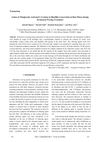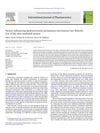 165 citations,
September 2003 in “Toxicology and applied pharmacology”
165 citations,
September 2003 in “Toxicology and applied pharmacology” Blocking COX, especially COX-2, in the skin can reduce inflammation and pain and may help prevent skin cancer.
 137 citations,
October 2009 in “The American journal of pathology”
137 citations,
October 2009 in “The American journal of pathology” Matriptase is crucial for keeping epithelial tissues healthy and functioning properly.
 82 citations,
December 2015 in “Nanomedicine”
82 citations,
December 2015 in “Nanomedicine” Nanoparticle systems make cancer treatment less toxic.
 55 citations,
September 2017 in “Expert Opinion on Drug Discovery”
55 citations,
September 2017 in “Expert Opinion on Drug Discovery” Different factors affect where drugs are absorbed in the small intestine, which is important for effective medication use.
39 citations,
November 2005 in “The journal of investigative dermatology/Journal of investigative dermatology” Fatp4 is crucial for healthy skin development and function.
 35 citations,
January 2002 in “Scandinavian Journal of Urology and Nephrology”
35 citations,
January 2002 in “Scandinavian Journal of Urology and Nephrology” Finasteride reduces prostate bleeding by affecting blood vessel growth.
 23 citations,
November 2015 in “Phytotherapy Research”
23 citations,
November 2015 in “Phytotherapy Research” Certain herbal compounds, especially from bitter melon, can inhibit cancer growth and promote hair growth by blocking PAK1.
 18 citations,
January 2008 in “Sen'i Gakkaishi”
18 citations,
January 2008 in “Sen'i Gakkaishi” Thioglycolic acid and L-cysteine change hair structure differently during perms, affecting hair strength and curling efficiency.
 16 citations,
March 2008 in “International journal of pharmaceutics”
16 citations,
March 2008 in “International journal of pharmaceutics” Different factors like pH, gel type, and chemical enhancers affect how well hydrocortisone gets into hair follicles, and less hydrated skin doesn't work well with the test method.
 12 citations,
March 2020 in “Journal of Bioactive and Compatible Polymers”
12 citations,
March 2020 in “Journal of Bioactive and Compatible Polymers” Nanoparticles show potential for controlled release of hair loss drugs, improving treatment effectiveness.
 12 citations,
January 2018 in “Acta pharmaceutica sciencia”
12 citations,
January 2018 in “Acta pharmaceutica sciencia” Solid lipid nanoparticles can improve how well drugs that don't dissolve in water work and are safe.
 9 citations,
April 2019 in “Journal of structural biology”
9 citations,
April 2019 in “Journal of structural biology” Hair's internal fibers are arranged in a pattern that doesn't let much water in, and treatments like oils and heat change how much water hair can absorb.
Environmental pollutants like glyphosate, fluoride, and electromagnetic fields can cause health problems by damaging mitochondria and affecting metabolism.
 4 citations,
November 2022 in “Frontiers in endocrinology”
4 citations,
November 2022 in “Frontiers in endocrinology” The enzyme 5α-reductase type 1 is important for blood vessel development and fertility in the uterus.
 4 citations,
August 2022 in “The Scientific World Journal”
4 citations,
August 2022 in “The Scientific World Journal” Merremia peltata leaf extract, particularly the bufotalinin compound, shows potential for treating hair loss.
3 citations,
September 2018 in “Current Drug Delivery” The combination of propylene glycol and Tween® 80 improves finasteride gel effectiveness.
 2 citations,
November 2023 in “Bioactive materials”
2 citations,
November 2023 in “Bioactive materials” New method improves copper peptide delivery for hair growth three times better than current options.
 2 citations,
January 2022 in “Rasayan journal of Chemistry”
2 citations,
January 2022 in “Rasayan journal of Chemistry” Compounds from the Sansevieria trifasciata plant might be effective for treating hair loss.
 2 citations,
August 2021 in “Journal of pharmaceutical research international”
2 citations,
August 2021 in “Journal of pharmaceutical research international” Fenugreek seed extract in a nanoparticle gel could be a promising new treatment for hair loss.
 2 citations,
May 2012 in “Indian drugs”
2 citations,
May 2012 in “Indian drugs” Finasteride, a hair loss treatment, works better and is more stable when delivered through specially prepared gels, leading to increased hair growth.
 1 citations,
August 2024 in “Pharmaceuticals”
1 citations,
August 2024 in “Pharmaceuticals” Goat placenta extract in a special delivery system improved hair growth and thickness in chemotherapy patients.
1 citations,
February 2024 in “Pharmaceutics” Nanovesicles improve drug delivery through the skin, offering better treatment outcomes and fewer side effects.
 1 citations,
December 2022 in “Frontiers in Bioengineering and Biotechnology”
1 citations,
December 2022 in “Frontiers in Bioengineering and Biotechnology” New pharmaceutical biomaterials, especially nanomaterials, show promise for improving cancer treatment and disease diagnosis.
 1 citations,
January 2019 in “Elsevier eBooks”
1 citations,
January 2019 in “Elsevier eBooks” New scaffold materials help heal severe skin wounds and improve skin regeneration.
 1 citations,
January 2015 in “Journal of nutrition & health”
1 citations,
January 2015 in “Journal of nutrition & health” Fish oil improves skin health in people with diabetes and high cholesterol.
 November 2024 in “Journal of Cosmetic Dermatology”
November 2024 in “Journal of Cosmetic Dermatology” Valproic acid microemulsions improve skin delivery compared to regular solutions.
April 2024 in “Cosmetics” Microneedling improves skin and hair conditions by enhancing treatment absorption and stimulating growth factors.
 December 2023 in “Biological & pharmaceutical bulletin”
December 2023 in “Biological & pharmaceutical bulletin” IPM enhances skin penetration of hydrophilic drugs.
 September 2023 in “Molecular frontiers journal”
September 2023 in “Molecular frontiers journal” Exosomes show promise for skin rejuvenation and anti-aging in cosmetic dermatology.
 January 2023 in “Records of Pharmaceutical and Biomedical Sciences”
January 2023 in “Records of Pharmaceutical and Biomedical Sciences” Surfactants in spanlastics improve drug delivery by making nanovesicles more flexible and stable for painless administration through the mouth.

























